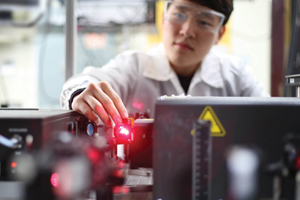PNU FOCUS Dynamic Development of Pusan National University
- 1The Era of Yangsan Campus
- 2PNU establishes specialized campus belt
- 3PNU hosts School of Oriental Medicine and School of Law
- 4PNU strengthens research competitiveness and increases support for each campus to develop their areas of specialty
- 5PNU runs Global Studies Program
- 6Global cooperation projects between industry and academia
PNU strengthens research competitiveness
and increases support for each campus to
develop their areas of specialty

Pusan National University is doing its utmost to strengthen its research competitiveness and to specialize in each branch of study, with the goal of presenting a new model for a national university and creating a college that leads the development of the Southeast region of Korea and Northeast Asia through a specialized development strategy.
PNU increases support to enhance research competitiveness

As part of its strategy to become one of the top five Korean universities by strengthening the competitiveness of its colleges, PNU adopted the Best Researcher system in 2007. Under the Best Researcher system, the professor that achieves the best research outcome in a three-year period receives a cash prize of 20 million won. In 2007, Professor Ha Chang-Sik of the School of Applied Chemical Engineering, Polymer Science and Engineering received the prize. In 2008, Professor Jung Hae-Young at the Department of Pharmacy was awarded the prize. By increasing its support for excellent researchers, PNU is strengthening its research competitiveness.
PNU is also increasing its subsidy to faculty members so that they can publish outstanding dissertations. The college offers 50 million won to the main author and 10 million won to the co-authors of any dissertations that are published in one of the top three science periodicals (Nature, Science, Cell). A total of 100 million won will be provided to an author whose dissertation is featured on the cover page of one of these three periodicals.
PNU also offers support through the establishment of a research fund in the liberal arts and social sciences, in order to vitalize research activities in these fields. The target is to collect 10 billion won, of which 2 billion won has been contributed so far. PNU contributes 500 million won to the fund every year.
In addition, PNU offers 1 billion won of special support to develop its life sciences department. It offers a total of 760 million won (360 million won for outstanding research projects, 400 million won for research projects of one's choice) to support research projects. In addition, as a special incentive for SCI dissertations, each dissertation that is carried in one of the top journals (top 10%) in each field receives six million won, while each dissertation carried in a journal of which the impact factor (IF) is above the average level receives 3 million won. In addition, 50 researchers benefit from PNU's Post-Doc program each year. Through these innovations, PNU is making focused efforts to sharpen its research competitiveness.
PNU selects areas of specialty

PNU has selected various areas of specialization. These areas can be categorized into Core Specialty Fields, which are fields in which PNU has the potential to become a global player, and possesses best-in-class research competitiveness; Strategic Specialty Fields, which are fields in which PNU holds research competitiveness and growth potential; and Strategic Fostering Fields, which are fields that were selected in line with the long-term development strategy of PNU. According to the principles of selection and concentration, PNU will be dramatically strengthening its support and providing more incentives in these areas of specialization. Through this approach, PNU aims to induce reform in the sub-groups under these areas as well.
Core Specialty Fields: 2 Fields
- ①Next-generation mechanical system (Department of Mechanical Engineering)
- ②Naval Architecture and Ocean Engineering (Department of Naval Architecture and Ocean Engineering)
Strategic Specialty Fields: 5 Fields
- ①State-of-the-art, fusion advanced matter physics (Department of Physics, Department of Physics Education, Research Center for Dielectric and Advanced Matter Physics)
- ②Molecular Sciences and Technology (Department of Chemistry, Polymer Science and Engineering Major, Center for Innovative Bio/Physio Sensor Technology (CIBST) )
- ③Longevity Life Science and Technology (Department of Pharmacy, Department of Biological Sciences)
- ④Environment and New & Renewable Energy (Chemical Engineering, Bio Engineering, Environmental Engineering Major)
- ⑤Cutting-edge Transportation System / Parts & Materials (Department of Material Science and Engineering, Department of Aerospace Engineering)
Sector for strategic development: 5 Fields
- ①International Studies, Fostering of Global Human Resources (Graduate School of International Studies)
- ②Commercialization and Use of Special Animals and Insects as Industrial Resources (Department of Animal Science, Department of Life Science and Environmental Biochemistry)
